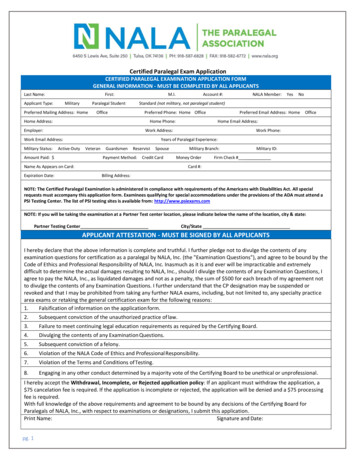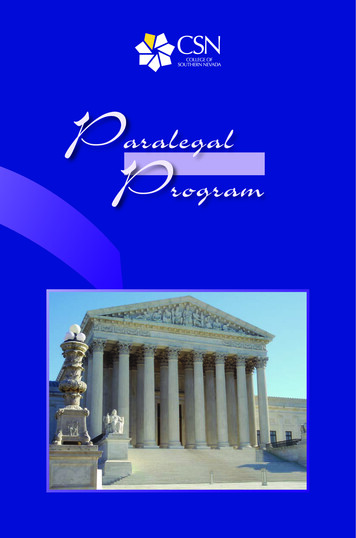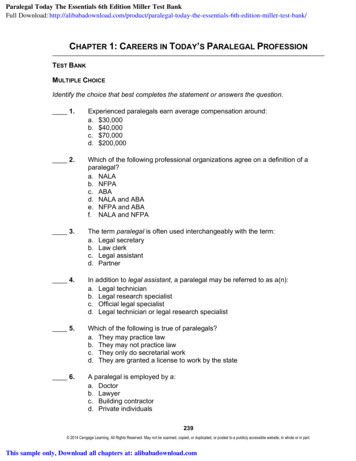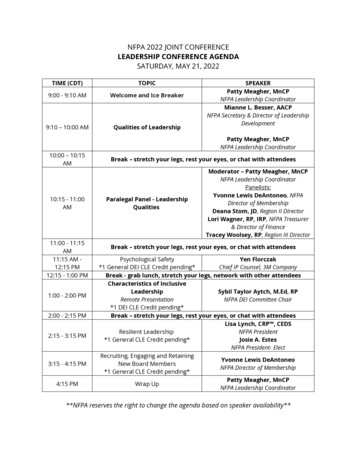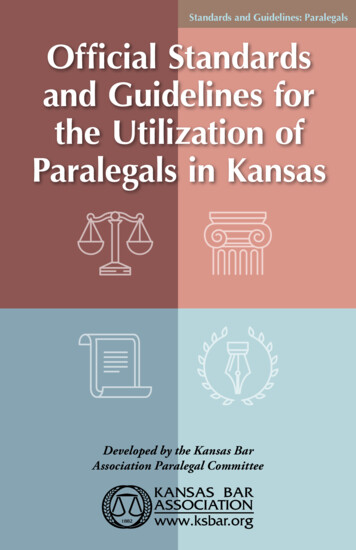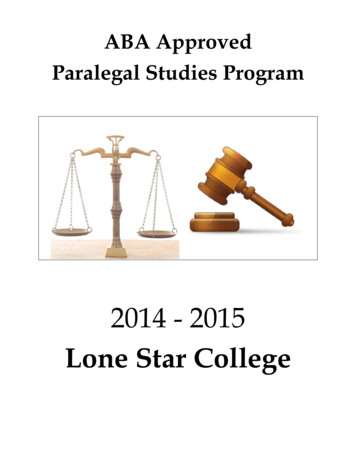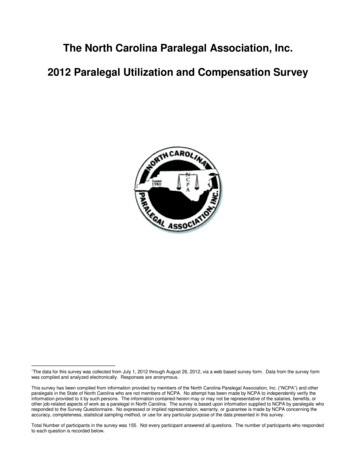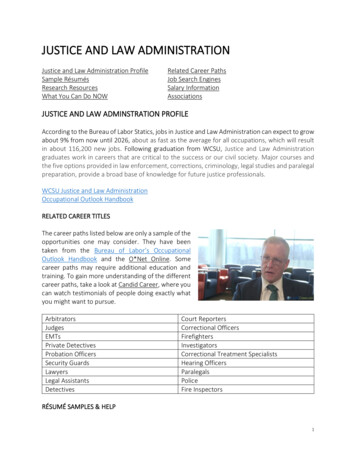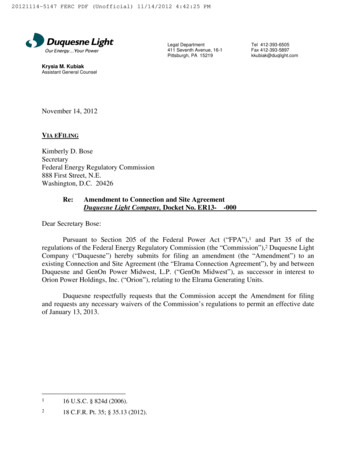
Transcription
Paralegal Institutecertificate in paralegal studiesE d u c at i n g P a r a l e g a l s S i n c e 1984Approved by theAmerican Bar AssociationVoting Member of theAmerican Association for Paralegal Education
The Paralegal InstituteMission StatementThe Paralegal Institute’s mission is to prepare students for careers as professional paralegals byproviding a well-balanced, fully integrated education including substantive knowledge, practical skillsand a perspective of themselves and the community that enable them to perform effectively in a varietyof legal settings.Graduates will: Understand the fundamentals of the legal system, its processes and alternatives Be capable of thinking creatively and in a legally sophisticated way about thecomplex and varying legal issues that they may encounter Understand the rules of professional conduct governing lawyers and their applicationto paralegals in all employment settings Develop analytical and judgment abilities and be capable of performing legal andfactual research using both traditional and emerging technology tools Develop knowledge and understanding of substantive law and legal principles in one or more areas of practice Develop sound legal writing and oral communication skills Be capable of applying knowledge management and organizational skills in the legal setting“Pursuing the education at the Paralegal Institute was the best choice I could have made.and I’veencouraged others to look into the program. Among other things, it augmented my skill set andhelped focus my liberal arts degree to an applicability to a variety of careers. Moreover, choosingDuquesne’s program was vital to my career as my employer had been seeking a graduate of an ABAapproved program specifically. I am now a contracts coordinator in a research setting and enjoyapplying the skills honed at the Paralegal Institute to research contracts on a daily basis. Every coursewas worthwhile.”2– Mary Zangrilli, Alumna
Certificate in Paralegal StudiesIntroductionTheParalegalProfessionThere has never been a better time to become a paralegal. The U.S. Department ofLabor rates paralegals among the fast-growing occupations.A paralegal, or legal assistant, is a person, qualified by education, training or work experiencewho is employed or retained by a lawyer, law office, corporation, governmental agency or otherentity and who performs specifically delegated substantive legal work for which a lawyer isresponsible.Today a paralegal’s responsibilities may include client and witness interviews, legal research,drafting correspondence, pleadings and other legal documents, conducting real estate closingsand summarizing discovery documents.In addition to employment with law firms, paralegals are an essential part of business entities,municipalities, state and federal government agencies, public service organizations andadvocacy groups.TheParalegalInstitute:A ProfessionalEducationTheParalegalInstitute:Credit Toward aMaster’s DegreeDuquesne University’s Paralegal Institute provides a post-baccalaureate, noncreditcertificate program that is intended to respond to the ever changing needs of the legalprofession. A bachelor’s degree is required for admission.In addition to providing our students with essential research and writing skills, Duquesne’sAmerican Bar Association (ABA) approved program will develop the student’s ability to think ina legally sophisticated manner about the many complex issues encountered in the courseof a career in the law. Students will leave with an understanding of the ethical and professionalresponsibilities of a paralegal.Students who successfully complete their paralegal certificate in the Paralegal Instituteare eligible to receive academic credit toward several graduate programs in the School ofLeadership and Professional Advancement. Depending on the program you select, you canenter with up to six credits toward your master’s degree.“Duquesne’s program has prepared me for my current job in a profound and excellent way. Through my class workand meetings at Duquesne, I feel as though I am head and shoulders above other paralegals who have not gone toDuquesne’s paralegal program.”– Stefan Heidinger, Alumnus3
Application Requirements and ProceduresThe application process for the Paralegal Institute is streamlined to fit the needs of the busy adult student. You mustcomplete the following before your application will be reviewed by the Admissions Committee. ApplicationDownload an application at www.duq.edu/paralegal or request an application by calling 412.396.1643. Letter of InterestA letter that accompanies your application that describes your background plus education and/or career goals maybe sent via e-mail to paralegal@duq.edu or to the address below. Official college and/oruniversity transcript(s)A bachelor’s degree is required for admission. All transcripts must be requested in writing. Transcripts marked“Issued to Student” are not official. Official transcripts are only those mailed directly to the Paralegal Institute fromthe issuing institution. Have transcripts sent to:Duquesne UniversityParalegal Institute705 Libermann Hall600 Forbes AvenuePittsburgh, PA 15282 Admissions InterviewAll applicants should schedule an interview with the program coordinator.Please call 412.396.1643 to schedule an appointment.If you have additional questions about the admissions procedure, please call 412.396.1643.Duquesne University, motivated by its Catholic identity, values equality of opportunity, human dignity, racial, cultural and ethnic diversity, both as an educationalinstitution and as an employer. Accordingly, the University prohibits and does not engage in discrimination or harassment on the basis of race, color, religion,national origin, sex, age, disability, or status as a veteran or disabled veteran. Further, Duquesne will continue to take affirmative steps to support and advancethese values consistent with the University’s Mission Statement. This policy applies to all programs and activities of the University, including, but not limited to,admission and employment practices, educational policies, scholarship and loan programs, and athletic or other University-sponsored programs. This is acommitment by the University in accordance with its religious values and applicable federal, state, and local laws and regulations. Nothing herein, however,should be interpreted as a waiver by the University of its own constitutional and legal rights based upon its religious affiliation. The person responsible forcoordinating its efforts under this policy is Dr. Judith R. Griggs, Affirmative Action Officer, Ground Floor Administration Building, University; 412.396.6661.4
Certificate in Paralegal StudiesCurriculumCoreCurriculumAll students are required to complete the followingcore ion to the Legal System and ParalegalismProfessional Responsibility and Paralegal PracticeLegal Research MethodsLegal Writing and Case Analysis I (Prerequisite: 550)Legal Writing and Case Analysis II (Prerequisite: 551)Certificate in General PracticeAll Core CoursesFive ElectivesCertificate in Civil Litigation ConcentrationAll Core Courses510Civil Litigation I511Commercial Contract Law517Civil Litigation II (Prerequisite: 510)518Torts/Personal Injury Law543Advanced Civil Litigation (Prerequisite: 510)Certificate in Corporate Law ConcentrationAll Core Courses511Commercial Contract Law515Real Estate Law or 540 Intellectual Property524Corporate and Business Law I527Corporate and Business Law II (Prerequisite: 524)528Federal and State Securities (Prerequisite: 524)529Corporate Financing (Prerequisite: 524)Certificate in Estates ConcentrationAll Core Courses512Estates, Wills and Trusts515Real Estate Law524Corporate and Business Law I or 549 Healthcare Law537Elder Law (Prerequisite: 512)541Federal and PA Death Tax (Prerequisite: 512)For proper sequencing, (501)Introduction to the Legal Systemand Paralegalism should be takenat the beginning of the program.(550) Legal Research Methods is aprerequisite for (551) Legal Writingand Case Analysis I, which is theprerequisite for (552) Legal Writingand Case Analysis II. Students donot, however, have to complete allcore courses before taking otherclasses. Core courses and electives orconcentration courses can be taken atthe same time. Ethical considerationsand issues are taught throughout thecurriculum.*Students in the intensive summerprogram earn a certificate in generalpractice via a set curriculum.A Paralegal Certificate is grantedafter the faculty has carefullyevaluated the student’s performance,based on written and oralassignments, examinations andparticipation in class discussions.The general certificate comprisesa total of 33 CEUs. The coursesrequired for the certificate are noncredit. The Continuing EducationUnit (CEU) is a nationally recognized,standard unit of measurement thathas been adopted for post-secondaryprograms and educational coursesnot carrying credit. Ten hours of inclass participation equals one CEU.Certificate in Litigation Technology ConcentrationAll Core Courses510Civil Litigation I517Civil Litigation II (Prerequisite: 510)543Advanced Civil Litigation (Prerequisite: 510)544Litigation Technology I545Litigation Technology II (Prerequisites: 510 and 544)5
Academic StandardsWithdrawalAll students must maintain a cumulative grade point average of 2.5 incourse work in order to be eligible for graduation. If a student’s cumulativegrade index falls below 2.5 at the end of the first or second term, he or shewill be placed on academic probation. A student on probation is expectedto achieve at least a 2.5 average the following term, or be subject to possibledismissal. Students must complete the certificate in no more than five (5)years. Students who exceed this requirement must re-apply through theAdmissions Committee.For termination of attendance in courses after the fourth week of class,a “W” will appear on the transcript. Students are financially responsible forall withdrawals. In most cases, withdrawals must be processed before thefifth week of the term.The grading system at the Institute is as follows:A (4.00) 94-100B (3.00) 83-86A- (3.75) 90-93B- (2.75) 80-82B (3.25) 87-89C (2.25) 75-79C (2.00) 70-74D (1.00) 60-69F (0.00)Courses graded I (Incomplete) or W (Withdrawal) do not earn CEUs, and ifrequired for program completion, must be repeated and passed.“Incomplete” Grade PolicyStudents receiving an incomplete (“I”) grade have six weeks (threeweeks in summer session) from the original due date to complete courserequirements. If the requirements are not met within six weeks (threeweeks-summer), the “I” grade will be changed to an “F.”Although transfer credits are typically not accepted into the paralegalprogram, each request will be evaluated on an individual basis. Coursesbeing considered for transfer must have been taken within the past fiveyears from an ABA approved program. Only course grades of “B” or betterwill be considered for possible transfer. No more than two courses will beconsidered for transfer.General InformationThe Paralegal Institute Office is located on the 7th floor of LibermannHall, on the Duquesne University campus. The Law School and Libraryare also located on campus. Textbooks are available for sale in the campusbookstore.Academic Calendar - There are four terms each year: Fall, Winter, Springand Summer.Audited Course PolicyFall Term: September - DecemberWinter Term: January - MarchCourses may be audited but are not eligible to be converted to matriculatedunits. Auditors must declare at registration that the course is being takenfor audit and must pay the full course tuition.During the Fall, Winter and Spring terms, only evening classes are offered.Each class meets one evening per week from 5:30 to 8:30 p.m. for eleven(11) weeks.PlacementThe summer program is a full-time intensive day format in which studentscan complete the entire program and earn their certificate in generalpractice in twelve (12) weeks. Summer classes are held Monday - Thursdayfrom 8 a.m. to 4 p.m. and Friday from 9 a.m. to 4 p.m. Students interestedin enrolling in the summer program are urged to apply early because oflimited seating and the substantial interest in this program. Visit www.duq.edu/paralegal for addtional details on the summer program.While the Institute cannot guarantee employment, every effort is made toequip students with the skills needed to find law related positions. Lawfirms, businesses and government agencies contact the Institute seekingcandidates for vacancies. Current position openings are posted onlinethrough the Career Service Center and are available to all Paralegal Institutestudents and alumni. Students and alumni are invited to work with thecampus Career Services office.InternshipsStudents are encouraged to pursue an internship to enhance their paralegalstudies. Opportunities are available with law firms, government agencies,health care agencies, social service agencies and corporations. Studentsmust successfully complete sixteen hours per week for ten weeks, alongwith a classroom component of eight hours total, to earn elective unitstoward their certificate. Internships are available during each term. Formore information, please contact the program coordinator at 412.396.1643.Refund Policy100% - Prior to the beginning of the first week of class.90% - Prior to the beginning of the second week of class.75% - Prior to the beginning of the third week of class.50% - Prior to the beginning of the fourth week of class.0% - After the fourth week of class.COMPUTER COMPETENCYBefore students complete the certificate, they must substantiate computercompetency. For more information, please contact the program coordinatorat 412.396.1643.6Transfer PolicySpring Term: April - JuneSummer Term: June - AugustResearch Facilities - Paralegal students are permitted to use theDuquesne University School of Law Library. Most books from the generalparalegal collection may be checked out of the library.Class Attendance Policy - Since the course materials are of a technicaland intensive nature, students are required to attend all classes. Studentsmust inform their instructor if they will be unable to attend a particularclass.Student Conduct and Academic Integrity - Students at the Instituteare expected to conduct themselves in a manner consistent with thehigh standards of professionalism to which lawyers themselves must adhereunder the Model Rules of Professional Conduct. The Institute reserves theright to dismiss any student for falsification of admissions information ordishonesty involving class assignments or exams.www.duq.edu/studenthandbookStudents are reminded that in the conduct of their business and academicaffairs at the Institute, even the appearance of impropriety is to be avoided.Students who fail in any regard to conduct themselves in a mannerconsistent with these statements may be dismissed.Additional policies are listed on www.duq.edu/paralegal
Course DescriptionsCore CurriculumThe five core courses are offered each term.Students are advised to complete Introductionto the Legal System and Paralegalism and LegalResearch before taking any other coursework.Elective courses are offered at least once per year. Core Courses501 Introduction tothe Legal System andParalegalismThis introductory course will provide studentswith an understanding of the language of thelaw, important legal concepts, the workingsof the American legal system and mostsignificantly, the role of the paralegal in thissystem. Students will be introduced to themajor substantive areas of the law as well asthe procedural aspects of the practice of lawand professional ethics. Although students willreceive a national perspective on the law, therewill be coverage of Pennsylvania practice.505 ProfessionalResponsibility andParalegal PracticeThe aim of this course is to introduce studentsto the ethical dimensions of paralegal practice:the rules by which lawyers practice law and thestandards of conduct for non-lawyer personnelworking in the legal profession. The course willalso examine law office management principlesso that students will understand the context inwhich their skills will be applied. This courseprovides a forum in which paralegal skillswill be combined with the organizational,administrative and professional skills essentialto paralegal success.550 Legal ResearchMethodsThis course will provide an introduction tolegal research methods utilizing print, onlinedatabases (i.e., WestlawNext and LexisNexis),and fee and free Internet sites. The course willcover primary sources (constitutions, statues,regulations and case law) and secondarysources (encyclopedias, periodicals, ALR,treatises, etc.).551 Legal Writing andCase Analysis I511Using real-world fact scenarios, this courseteaches students the skills needed tounderstand legal fact patterns, analyze the lawas it applies to those fact patterns and writethe various legal documents that often aregenerated when law firms are presented withsimilar situations. The course will emphasizethe process model of writing where thestudents will work closely with their peersand instructor on creating numerous draftsof a document before producing an endproduct. Students will learn to think and writeusing the conventions of the legal profession.(Prerequisite: 550)Students will study commercial law withparticular reference to the common law ofcontracts, the Uniform Commercial Code,debtor-creditor rights and consumer law. Thiscourse deals with the rights and remedies ofbuyers and sellers of goods, the creation ofsecurity interests and other general principlesof contract law. Students will be trained toassist lawyers with these matters.552 Legal Writing andCase Analysis IIStudents will be asked to build upon the skillslearned in 551 Legal Writing and Case AnalysisI and taught to research, draft and edit complexlegal documents. Emphasis will be placed onthe writer’s audience and critical legal analysisof court opinions, statutes and secondary legalresources. Students will use their legal analysisskills to translate pertinent ideas into cogentand successful legal documents using, whereappropriate, classical rhetorical devices todispute, explain and convince an audience ofthe legal merits of their argument. (Prerequisite:551) Electives510 Civil Litigation IStudents will learn the basic aspects of civillitigation, which include jurisdiction, venue,identification of local courts, initiation of civilproceedings, motions practice, e-discoveryand discovery procedures, trial proceduresand basic evidentiary problems. The courseemphasizes those areas in which a paralegalmay assist counsel in preparation for litigation,such as identification of factual and legalissues, drafting pleadings, interviewingwitnesses, preparation of witnesses fortrial, obtaining evidence through discovery,organizing documentary evidence and the useof demonstrative evidence. References willbe made to administrative law and appellateprocedures.Commercial ContractLaw512 Estates, Wills andTrustsStudents will be introduced to the variousforms of ownership of property. Studentswill also learn about the distinction betweenprobate and non-probate assets, the differencebetween the probate estate and taxable estate,Pennsylvania law of intestate succession andformal requirements for drafting Wills andTrusts. Students will learn how to completeall forms required by the Register of Wills. Theimportance of establishing tickler dates forvarious date-driven tasks will be emphasized.Students will also take part in the preparationof Pennsylvania Inheritance Tax and FederalEstate Tax Returns. Practicing paralegals mayprovide presentations.513 Domestic LawStudents will be introduced to family law,its court system and procedures. The areasdiscussed will range from requirements for avalid marriage to dissolution of marriage, viaannulment and divorce. In addition, spousaland child support, alimony, alimony pendencelite, paternity, custody, adoption and the veryvolatile area of domestic violence will beexplored.515 Real Estate LawThis course will be a survey of the language,concepts and transactions used in thatarea of the law called“real estate”or “realproperty.” The objective of this course is toprovide the paralegal with the skills necessaryto comprehend the documents, followthe procedure and understand the theorynecessary when a law office is retained torepresent buyers, sellers, mortgage lenders,builders, developers, landlords, tenants or anyother interested parties to a real estate matter.7
Course Descriptions516 Criminal LawStudents will be introduced to criminal law,definitions, penalties, realities of criminalpractice, and federal, state and local rulesof procedure. The student will learn aboutsearch and seizure, bail hearings, pretrialdiscovery, indictment, arraignment, pleas andtrial procedures. Motions and other relateddocuments may be prepared.517Civil Litigation IIThis advanced-level course regarding civillitigation in federal and state courts focuses one-discovery, which has become a substantialcomponent of most civil suits filed in theUnited States. Students will learn howthe Federal Rules of Civil Procedure andanalogous state rules address the discoveryof electronically stored information (ESI),and will examine a number of key courtdecisions related to e-discovery. Students willalso study analyses prepared by the SedonaConference, the leading organization studyingthe escalating effects of e-discovery on civillitigation. The course will provide practicalinstruction about the administrative andmechanical aspects of obtaining and providinge-discovery in litigation, as well as commonissues related to using ESI as evidence at trial.(Prerequisite: 510)518 Torts/Personal InjuryLawStudents will be introduced to the substantivelaw of torts. Students will learn the basicelements of negligence/medical malpracticeclaims, intentional torts, claims of strict andproducts liability, defamation and relatedprivacy torts as well as automobile insuranceclaims. Students will learn all viable defensesto each tort. The course will also examineissues surrounding the legal concepts ofcausation, damages, remedies and vicariousliability. Students will learn how to analyzefacts and recognize a potential tort/personalinjury cause of action, as well as how to assistin the preparation and adjudication of a tort/personal injury trial.519 InternshipStudents may be placed in a paralegal positionwith a private law firm, government agency,court office, corporation, insurance company,bank, real estate company, communityservice agency, health care facility or other8appropriate office. The term of the internshipis 16 hours per week for 10 weeks. Therewill be an additional classroom componentof 8 hours held in 4 two-hour sessionsduring the evenings. The student will learnthe practical daily operation of the assignedoffice. Supervised by a licensed, practicingattorney and usually by a practicing paralegal,the student will be both an observer and aparticipant in the operation of the assignedoffice. Normally the student receives nosalary or compensation for his/her service. Aninternship at a student’s place of employmentwill be allowed only under restrictedcircumstances.(Prerequisites: minimum 2.75 GPA, 501, 505, 550,551, 552)524 Corporate andBusiness Law IStudents will be introduced to corporateand business law concepts. There will be ageneral discussion of various types of businessorganizations such as sole proprietorships,general partnerships and limited partnerships.The emphasis of this course, however, will becentered on various types of corporations suchas nonprofit, professional, close and businesscorporations. Regulation of public companieswill also be reviewed. Students will learnhow to prepare minutes and resolutions ofshareholders’ and directors’ meetings and otherrelated documents.527 Corporate andBusiness Law IIStudents will learn about agreements anddocuments and how they are prepared andutilized in a business corporation. Thesewill include shareholders and employmentagreements, merger, asset and stock purchasedocuments, closing documents and otherrelated agreements. Students will be awareof the ethical and the specific functions of acorporate paralegal. (Prerequisite: 524)528 Federal and StateSecuritiesStudents will study the various conceptsinvolved in connection with various stockofferings. Emphasis will be placed oncompliance with federal and blue sky offerings,securities and regulations. (Prerequisite: 524)529 Corporate FinancingStudents will study corporate structures offinancing and will be introduced to many ofthe loan agreements, security agreements,guarantees, notes, mortgages, financingstatements, leases, subleases, trusts, escrowagreements, indentures and loan transactions.Students will learn how to prepare and draftrelated documents. (Prerequisite: 524)530 Immigration Law andProcedureThe Immigration Nationality Act of 1952,as amended, is examined and emphasiswill be placed on the most commonly usednon-immigrant working visas, permanentresidency (both family and employmentrelated) and alien labor certifications.This is a hands-on course in which studentslearn how to prepare various applications andpetitions particular to this field.532 BankruptcyThe purpose of this course is to introduce andexplain the Federal Bankruptcy Code and statecollection procedure to paralegals. The coursewill be geared to preparing future paralegalsto perform tasks routinely encountered ina bankruptcy practice. We will review thegeneral theory underlying the BankruptcyCode. We will examine the rights and dutiesof debtors under the Bankruptcy Code. Variousclassifications of creditors and different creditorremedies will also be explored. The studentwill conduct a client interview and prepare thenecessary documents to complete a bankruptcypetition, along with having an understandingof the principles underlying the documents.533 Administrative LawThis course explains the role of administrativeagencies, our “4th Branch of Government,”aswell as the methods by which they conducttheir business. Students will also explore thestatutory, common law and political limitson administrative agency power. Practicingparalegals may speak on the skills used in thispractice area. Students may complete a projectas part of the course.
534 Environmental LawStudents are introduced to the major federal,state and local environmental laws throughreadings and exercises designed to highlightthe role of environmental paralegal, withparticular emphasis on environmental issuespertinent to Western Pennsylvania.536 Alternative DisputeResolutionAlternative Dispute Resolution (ADR)processes are exploding in popularity. Theapplication of ADR is becoming increasinglywidespread in all areas of the legal system.This course examines the processes thatcompliment the traditional litigation process.Students will have hands-on opportunitiesto experience negotiation, arbitration andmediation as they explore the advantagesand problems associated with each of thesealternatives.537 Elder LawThis special topics course focuses on thelegal issues affecting our aging populationwith an emphasis on such practice areasas: medicare, medicaid, end-of-life decisionmaking, long-term care issues, nursing homesand alternatives, elder abuse, estate planningand asset protection, disability planning andprobate matters such as conservatorships.(Prerequisite: 512)540 Intellectual PropertyLaws and ProceduresIntellectual property (patents, trademarksand copyrights) is a rapidly increasing areaof law wherein paralegals are an integralpart. This course will focus on the law of theprocurement and protection of intellectualproperty rights. Emphasis will be placed onthe application of intellectual property lawprinciples and preparation of the commonlyused forms and submissions in practice.Students will gain a basic understandingof intellectual property law and a strongunderstanding of the application of the law.In-class projects, assignments and computerresearch will provide hands-on experience withfinding the answers often posed to intellectualproperty paralegals.541 Federal and PADeath TaxStudents will gain a fundamentalunderstanding necessary for the preparationof simple Pennsylvania and federal deathtax returns. Specific matters include anintroduction to the concept of transfer taxes;identification and valuation of assets subjectto death taxes; preparation of the PA formREV-1500; an introduction to the U.S. estatetax return (form 706); calculation of PAinheritance tax and federal estate tax liabilities;introduction to the tax considerations relatedto martial bequests and charitable bequests;introduction to the basics of the taxation oflifetime transfers and the federal gift tax return,and an introduction to the technologicalresources available for computer assistedpreparation of death tax returns and relatedresearch. (Prerequisite: 512)543 Advanced CivilLitigationThis is a hands-on practical skills course thatbuilds on critical analysis, theoretical andpractical skills provided in the civil litigationtrack. The course will focus on completion ofprojects and assignments typically encounteredin litigation firms or departments and willprovide instruction and use of selectedlitigation support software programs. Studentswill become familiar with key terms usedthroughout the litigation practice and supportindustry. Students will cite check a brief, learnproper citation format, learn to electronic file instate and federal courts and other procedures.This is a participation and projects orientedcourse. (Prerequisite: 510)544 LitigationTechnology IThis is the first of two litigation technologycourses and will focus on Microsoft Officeprograms. Basic knowledge of Microsoftis assumed. This course will focus onintermediate and some advanced applicationsin the la
in enrolling in the summer program are urged to apply early because of limited seating and the substantial interest in this program. Visit www.duq. edu/paralegal for addtional details on the summer program. Research Facilities - Paralegal students are permitted to use the Duquesne University School of Law Library. Most books from the general
